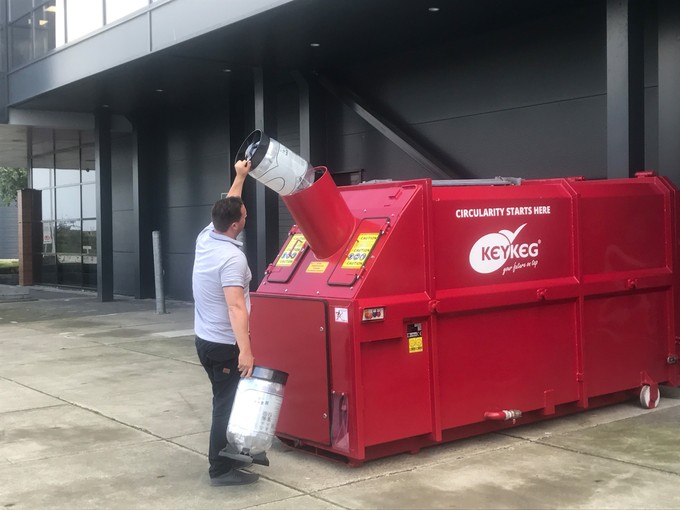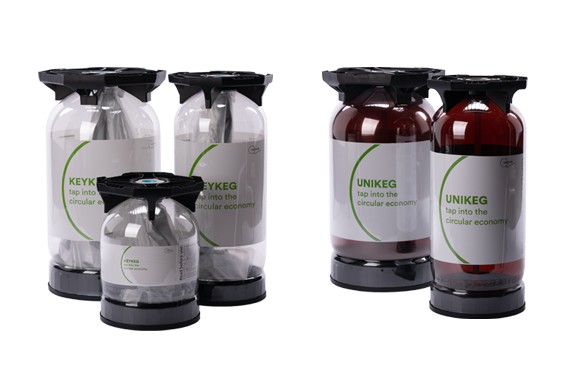Circling back
A community crusade could be key to the future credentials of one supporter of single-use plastics. Jane Douglas-Jones explains.
OneCircle believes in single-use plastics. Formerly known as Lightweight Containers, this family business based in the Netherlands produces a range of disposable PET kegs, called KeyKegs, for beverages including beer, wine, kombucha and coffee.
Wait a minute... aren't we all supposed to hate single-use plastics? Well, when you get down to it, of course, the problem has less to do with the plastics themselves and more to do with the disposal of plastics waste. If collected, recycled and reused, plastics are actually some of the most eco-friendly types of packaging.
And this – a circular system for plastics – lies at the heart of OneCircle's business. The company believes in a sustainable future in which packaging will not have an impact on the environment.
"KeyKeg is the only keg that was designed with circularity in mind from the very beginning," said Annemieke Hartman, a member of the board at OneCircle. "For us, landfill or incineration is not an option. We started to reuse plastics to create the grip rings and base cups, which are now made from 100 per cent post-consumer recycled materials. Today, KeyKegs are collected with the aim of creating new KegKegs, which are made from 100 per cent reused materials."
Hartman explained that OneCircle is continuously innovating to ensure that it meets its ambition that all KeyKegs will follow the full cradle-to-cradle principles. "For example, we have just unveiled a 30-litre KeyKeg with an overall recycled material content of 58 per cent."
In this new keg, the outer container includes 62.5 per cent post-consumer rPET material. The load-bearing inner container weighs in at 40 per cent post-industrial rPET. As on every KeyKeg, the grip and base cup are made of 100 per cent recycled PP.
This new keg joins OneCircle's portfolio of products. KeyKegs come in three sizes (10-, 20- and 30-litres). They are light in weight and easy to stack, store and transport. Each KeyKeg has a double-wall design with two robust layers of PET to ensure product safety during shipping and dispensing.
Meanwhile, KeyKegs also feature a Bag In Keg design – a laminated bag inside the PET container. This serves to safeguard product quality and shelf life and offers protection from exposure to oxygen. Beer, for example, will stay fresh in a KeyKeg for as long as it would in a steel keg. After tapping, the beer is fresh for three-to-four weeks, on average.
In addition, OneCircle also offers UniKeg products. As well as the double wall technology, these kegs have a spear and conventional fittings. Innovation is also ongoing in this range. For example, the company recently launched its UniKeg A. The A-fitting (also known as the German slider) is compatible with existing MicroMatic universal coupling systems.
So, what else could tempt a company to move away from steel kegs and towards plastics containers? KeyKegs offer a number of additional benefits. "Customers switching to KeyKegs can be reassured that they are choosing the most innovative, safe and sustainable PET keg range, which provides premium protection for draught beverages, ensuring they reach con-sumers around the world as fresh as the day they were produced," said Hartman.
She highlighted the financial advantages of using KeyKegs compared to traditional steel kegs. "The total cost of initial investment in the steel keg pool, the constant distribution of new kegs and the cost of repairs can be significant," she explained. "There is also the considerable cost of return transportation as well as those costs associated with administration and handling."
In addition, there are significant environ-mental benefits. "KeyKegs dramatically reduce carbon emissions because they are lighter and their compact design means that they have a 25-30 per cent higher loading capacity than steel kegs, meaning more can be transported in one go and no return journey is required," said Hartman.
Another advantage concerns water use. "KeyKegs are ready for use immediately and do not require washing like steel kegs, saving water," Hartman added. "An additional benefit is that no harsh cleaning chemicals are required either."
KeyKeg customer Brooklyn Brewery is happy with its decision to choose PET kegs. The brewery is one of the largest craft beer exporters in the US. Choosing the right packaging was, therefore, critical for the company.
"The brewery was growing rapidly and there was a huge opportunity to take the brand to overseas markets if we could do so in a cost-efficient, sustainable way," said Joe Thompson, supply chain manager at Brooklyn Brewery.
"For this, we needed a lightweight product that would keep the beer in premium condition over long journeys," he explained. "In 2011, we trialled a range of packaging options and KeyKeg proved the perfect fit. The kegs kept the quality of the beer, it was easy to use for our customers and the customer service provided by the team was excellent."
The brewery now uses KeyKegs for all its exported beer, which travels to Sweden, the UK, France, Japan, Singapore, Korea, China and Australia. "Now we are filling around 750 to 1,000 20- and 30-litre slimline KeyKegs every month as we send our whole range over-seas," Thompson added.
While beer makes up the largest proportion of beverages in KeyKegs, there is also untapped potential in the wine market. Six years ago, Christophe Coquard the founder of Maison Coquard – a boutique wine and drink agency in Beaujolais – asked his bottling partner to start filling wine in KeyKegs as well as bottles.
There was some reluctance at the beginning, due to unfamiliarity with the packaging format. But once users understood the technical use of he kegs and how to palletise them, Chardonnay, Sauvignon, Cabernet Sauvignon and Merlot all enjoyed rapid growth.
Maison Coquard is now firmly established as a specialist in France for French wines in kegs. The company also works with Rank in the Netherlands and is establishing itself in the US and Sweden.
According to Christophe Coquard, the success of wine in KeyKegs is down to the technology, which offers the storage and preservative qualities of a metal keg with the ability to pop the keg in a recycling bin when it is empty.
KeyKegs have been carefully designed to make recycling easy. Customers simply deflate the keg using the KeyKeg deflating tool, flatten it, remove the grip ring and deposit. The used kegs can either be taken to a special KeyKeg collection site or they can be recycled locally.
"There's the added value that the keg can be recycled, with instructions clearly visible on the sleeve," said Brooklyn Brewery's Thompson. "It's important that our customers see it through to the end of its lifecycle once it has completed its journey."
Meanwhile, Coquard believes that there are four main reasons why KeyKegs are a real game-changer when it comes to wine service: reduced storage space – a 20-litre KeyKeg holds 26.6 bottles worth of wine – a reduction of over 50 per cent of the storage footprint of bottled wine; reduced waste as kegs are crushble by hand and are completely recyclable. One 20-litre keg removes the need for 16kg of glass, 26 capsules, closures and labels, and 1.6kg of cardboard; steel kegs have to be returned to the fillers and have the added cost of deposits in the supply chain; and there is no need to pay for bottles, labels, capsules, or cases, while the lightweight kegs make shipping cheaper. In addition, the kegs remove spoilage costs from oxidation and corked bottles, shrink storage and electricity costs by reducing refrigeration space, and remove the glass disposal cost of the replaced wines.
However, there is an obstacle to OneCircle's circular business model: the availability of recycled polymer is limited. As a result, OneCircle is growing its KeyKeg collection community to ensure that it has enough supply to reuse in new kegs. The company is confident that this obstacle can be overcome.
"OneCircle is aiming to start producing KeyKegs containing 45 per cent recycled material in the second quarter of 2020," said Hart-man. "KeyKegs are currently collected through hubs in the Netherlands, the UK, France, Spain, Switzerland, Ireland and Belgium.
"EU legislation requires all packaging to contain at least 25 per cent of recycled materials by 2025 and 30 per cent of recycled materials by 2030. By achieving the 45 per cent goal, OneCircle will far exceed the demands in EU regulations for 2030 already this year."
Hartman added: "OneCircle has also joined the Circular Plastic Alliance and signed the declaration that its products meet the environmental criteria of the EU so no additional tax will need to be levied on its products."
KeyKegs are used throughout the world. "OneCircle is also ensuring that its supply chain is as close to its customers as possible, with advanced production lines manufacturing KeyKegs in the Netherlands, Germany, Spain, the UK and the US, and at new warehouse facilities in Spain and Australia," said Hartman.
In addition to its own sales team, OneCircle has a global network of certified resellers who provide in-market technical support and local market knowledge to help customers. Building the reseller community around the world will be a key focus for 2020, particularly in the US and Europe. "We have just announced a new partner in Spain – Bruni Glass," said Hartman.
Meanwhile, the future for OneCircle lies in promoting the value of single-use plastics. According to Hartman, the company "will continue to innovate to drive up the recycled content in our kegs without compromising the quality of the product".
More information from OneCircle, Koperslagersweg 4, 1786 RA Den Helder, the Netherlands. Tel: 31 223 760 760. Email: info@lightweight-containers.com. Web: lightweight-containers.com

